The 2030 Agenda for Sustainable Development was heralded, when launched in 2015, “a “We The Peoples” Agenda” by the Secretary General of the United Nations (UN) Ban Ki Mon. Civil society representatives and organisations participated and contributed expertise to the development of the agenda, asserting it as “an Agenda of the people, by the people and for the people”. So, in the ‘decade of delivery’ for the Sustainable Development Goals (SDGs) and with the increasing role of social media in shaping public discourse, what engagement is there with the Agenda online?
To better understand engagement with SDG messaging, IDS used the Meltwater platform to complete an analysis of Twitter conversations during 2020 related to the Sustainable Development Goals. The findings reveal an acceleration in conversation but also that some contradictory narratives are gaining traction.
Tracking the global conversation
The first stage of analysis was to identify the most popular hashtags relating to the SDGs. Hashtags are used by people to categorise themes and link up conversations, so they can provide a useful lens into thematic online discussions.
To identify the most used hashtags relating to the SDGs, the search looked at tweets during both 2019 and 2020 that contain the terms ‘Sustainable Development Goals’ or ‘SDGs’.
The results showed similar top hashtags over both years, unsurprisingly, Covid-19 was a key hashtag in 2020, with climate-related hashtags remaining prominent both years.
The next stage was to carry out an analysis of the top SDG hashtags, so the search looked at the top three SDG-specific hashtags; #sdgs, #globalgoals and #agenda2030.
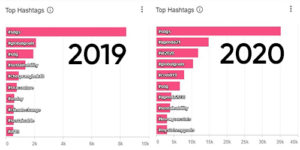
The results showed that use of the hashtags in 2020 accelerated by 253% compared with 2019.

The highest proportion of tweets were from Japan, with the US and UK following behind. (Note that the US and Japan have the highest Twitter users globally.)
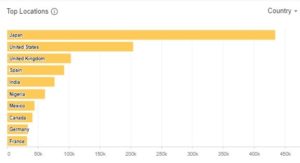
Analysing influential voices and key demographics
The next stage of the analysis was to review the most influential authors for the three hashtags. The top three people, based on their following, reach and relevance were the UN Secretary General, Antonio Guterres, the Deputy Secretary-General, Amina J Mohammed and climate activist, Greta Thunberg.
Across the three hashtags, the top influential organisations were the United Nations, UNICEF, UN Development and UN Women. It is unsurprising that UN accounts come out as top authors on a UN agenda, so we carried out an analysis of the top 20,000 most engaged tweets containing the hashtags, and segmented the authors into groups based their interconnectedness, mutually shared content, and how they describe themselves. This analysis helps to identify author demographics and the key sectors and thematic areas in online discussions. The data can be useful in thinking about what communications content might resonate for target audiences.
The following graphics show groups of people (segments) within the broader audience who are interconnected and the top locations. The size of the segments in the graph is proportional to the number of members of the detected segments. The lines represent interconnections between the different members of the segments, and the size of each circle represents the number of interconnections each user has.
#sdgs:
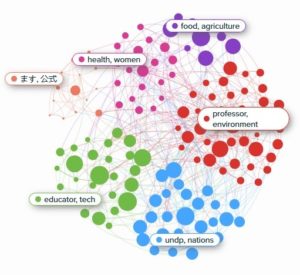
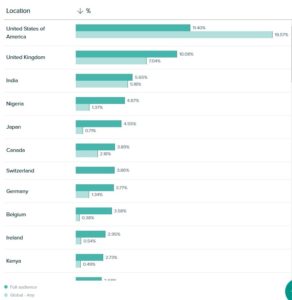
#globalgoals:

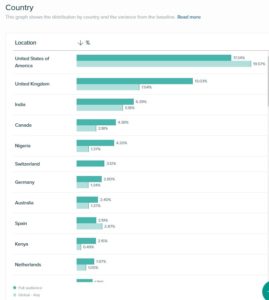
#agenda2030

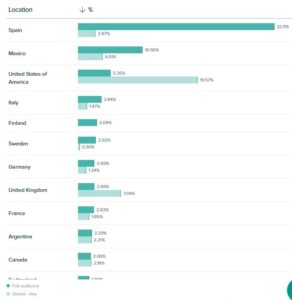
How are messages resonating?
Examining some of the most retweeted posts for each of the hashtags, provides a snapshot of the types of posts that were popular in 2020.
#sdgs:
UN Volunteers tweeted asking people to retweet if they want to volunteer for the #SDGs. It was the most retweeted #SDGs tweet in 2020, with over 2.2k retweets. This demonstrates that there is an appetite for participation in the SDG process. It is not clear from the post how people can get involved, so there may have been a missed opportunity here to deepen engagement.

#globalgoals:
A hugely popular Korean boy band, BTS, pledged their support for the SDGs and collaborated with the UN on a set of shareable ‘gifs’. The UN tweeted the gifs and the post was one of the most retweeted #GlobalGoals tweets of 2020, retweeted over 5.9k times with 20.8k likes. The popularity of this content is a result of the collaboration of two top social media influencers, and while the popularity is a success, the opportunity to inform and engage on the SDGs, is not clearly recognised.
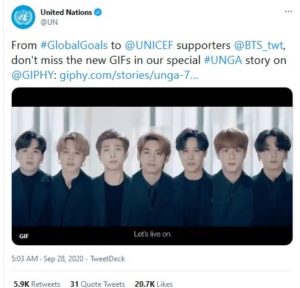
#agenda2030:
The #Agenda2030 hashtag was started by UN organisations but has seen a surge in posts from people suspicious of the SDG Agenda. The most retweeted post (retweeted just under 1k times, with 1.6k likes) taps into a growing conspiracy narrative around Covid-19 and the belief that a global elite is using the pandemic as an opportunity for a power grab. The linkage with the Sustainable Development Goals, stems from scepticism around ‘The Great Reset’ agenda of Davos 2020. This demonstrates how narratives can shift and grow, and presents challenges in how to engage with disaffected populations.

A route to understand and improve engagement
This world is at a critical moment in the delivery of the goals, and whilst there has been an acceleration in online discussion around the SDGs, this analysis also reveals that more needs to be done to inform, engage, and include people in the process. This presents a new opportunity, as much as a new source of risk for how messages around the SDG Agenda are communicated and received.
At a time of extreme uncertainty, with inequality gaps widening and public trust in large institutions waning, it is crucial to consider how perceptions of the SDGs as top-down agenda, might impact the achievement of the goals, in countries across the world. Understanding and recognising debates on social media, as a barometer of public mood and perceptions, can help shape more localised messages, as well as understanding the role and influence of leading voices in driving awareness. Efforts must actively seek to engage and amplify voices of marginalised and disenfranchised groups if the Agenda is to live up to its promise to truly ‘leave no one behind’.